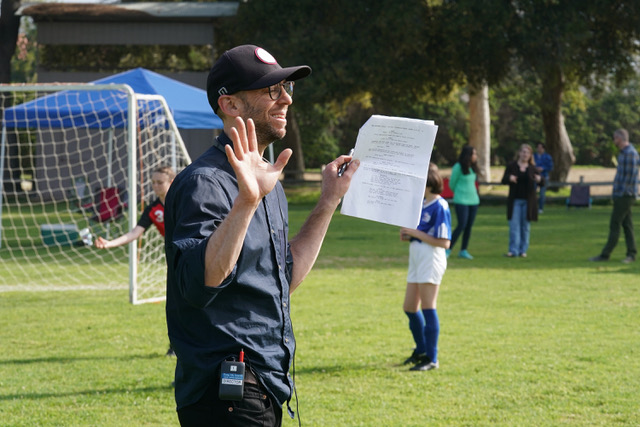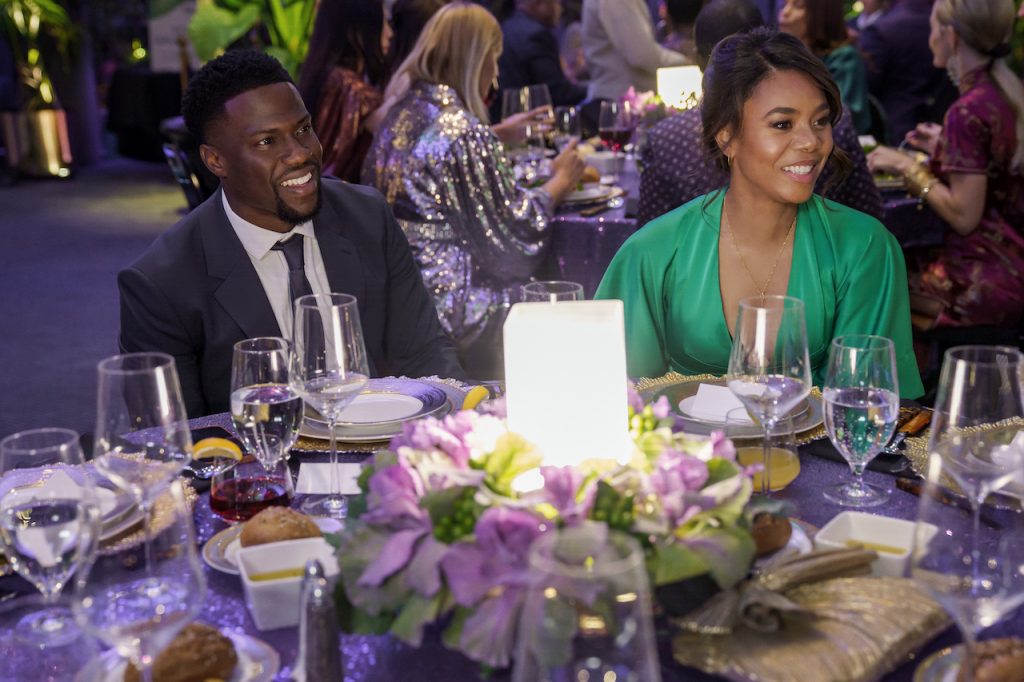“I was a comedy nerd kid,” declared screenwriter John Hamburg. “Then I got a video camera for my 15th birthday, and I started making short films. In college, I started writing plays and monologues. That’s when I got serious about writing.”
As a playwright, Hamburg said he learned the importance of writing and re-writing to the process. Eventually this led him to Film School and then a string of iconic comedies, like Meet the Parents, Zoolander, Along Came Polly, I Love You Man, Night School, and Me Time.
In the latest film for Netflix, Hamburg is both the writer and director. The plot follows a dad (Kevin Hart) who finds alone time for himself for the first time in years while his wife and kids are away, so he reconnects with an old friend (Mark Wahlberg) for a wild weekend.
“I tend to start with character and put a character into, what to me, is a relatable situation. It can be absurd, but that’s where I start. So I flesh out the character, think about what they want and what’s in their way.”

John Hamburg. Photo by Monty Brinton/ CBS/ Netflix
The sole purpose is to get the first draft done, then move on to the next draft. “I churn out the first draft pretty quickly—a vomit draft. Then go back and rewrite and revise. That’s where you learn about the characters.”
“I don’t make big sci-fi movies or superhero movies. I try to make grounded comedies about everyday people.” Meet the Parents was about meeting a spouse’s parents. I Love You, Man was about making friends as an adult. Me Time is about connecting with an old friend. “The details are really important to make those movies feel special and not just a run-of-the-mill comedy.”
Comedic Tone
“A lot of that is on the page,” said Hamburg of the unique dialogue in a movie like I Love You, Man. “As the director, in addition to being the writer, it can come through improv if you have the right actors. But tone is everything. It’s so important.”
“You see so many first-time filmmakers where the tone is all over the place. I see that because I made those same mistakes early on in my screenwriting career in particular. You just have to find your voice. All we have is our point-of-view. I didn’t succeed when I tried to be like someone else. It wasn’t until I relaxed into my perspective and what was funny to me that my career kind of started to take off.”
Some logical steps to help find your voice include live readings and conversations about the scripts. “I give the script to a lot of people. I’ll pitch the movie to friends and kind of gauge when they’re leaning forward or when they’re bored. That helps me figure the story out. A lot of writers are introverts, but I’m an extroverted person. I like to share the work because that feedback energizes me.”

Sonny (Kevin Hart) Photo by Saeed Adyani/ Netflix
Before the writing phase, Hamburg also talks through plot with friends, as it can be difficult to find the next project. “My brainstorming looks like the scribblings of a Mad Man,” he joked. “It’s all over the place. It’s a Word or Pages document of what if this, what if that. I guess if it sticks with me, my mind starts to generate more ideas. I think about it in the night or in the morning, that time of day before you’re fully conscious. But sometimes it’s not until a few years later.”
This happened with I Love You, Man. “I had read a script years earlier called Let’s Make Friends. I loved the concept, but the specifics of the script wasn’t a story I wanted to tell. But years later, almost in the middle of the night, I realized I knew how to tell that story, for me. So we got the rights to it and I wrote my own version.”
Writing Simple Stories
When we spoke with The Hangover writers Jon Lucas and Scott Moore, they told us, “A lot of great comedy concepts for movies are not that funny. If your idea for a movie is really really funny, you may be down the wrong track—you may be writing a sketch.”Hamburg agreed with this sentiment and chooses to stick with fairly simple stories where he can add a lot of character detail.
“I try to gravitate towards a simple, relatable, sticky idea that’s not crazy. I didn’t come up with the idea for Meet the Parents, although I worked on it extensively, but [that idea] is out there for everyone. You’ve got to meet the parents. It’s a right of passage. My new movie is about the idea that you’re always with your family, but then you get a few days to yourself. You’re out of practice, but what are you going to do? So I do think about simple ideas and then explode them from there.”
The story for Me Time came from a conversation with an Executive Producer. “I left the idea for quite some time. I think I made another movie in between, but I was playing with the Huck character, Mark Wahlberg’s character, who is this 40-year-old unmarried guy who is the life of these parties, but the people who come to the parties get younger and younger.”
Hamburg basically combined the two ideas. What if the dad who is never alone connects with the life-of-the-party. “The idea sort of took off from there.”
Actors Shape Characters
“I tend to revise quite a bit, especially on this project. When Kevin Hart got involved, I rewrote the script significantly, with his voice in mind. New scenes I thought would work with him. He’s a stay-at-home dad while his wife kills it in her career, so that was there, but a lot of the specifics – Doctor Silk and Burning Ma – came about after Kevin got involved.”
Hart and Hamburg spent a lot of time discussing the script over Zoom. Hart would riff on certain scenes and provide ideas that Hamburg would then try to make work in the story. The story was also unique because Wahlberg and Hart had been looking for a project for years to work on together.
“They definitely wanted to work together. Kevin came on first as my producing partner. I rewrote it for him. We were thinking who could play Huck and we went after Mark. His team read the script, maybe knew my stuff, and liked the idea of him working with Kevin. Then Mark liked it, I think because Huck is a questionable character, but his heart is in the right place. I think he connected with the generosity of spirit.”

Sonny (Kevin Hart) & Maya (Regina Hall) Photo by Cr. Saeed Adyani/ Netflix
Early on in his career, however, it was much harder to throw away pages and do full rewrites, at least in terms of mindset. “On Zoolander, I was working on a draft and I just did not have it. I was trying too hard and it just wasn’t working. I was writing, but it just wasn’t good.”
Hamburg said Ben Stiller had given him a shot on Zoolander thanks to the success of Meet the Parents, but he could see disappointment in the actor’s eyes with early drafts. “We had worked together a few times, but he was kind of taking a chance on me. But talking to him, I let something go and got in a rhythm and got in the zone — not trying too hard and letting it come to me.”
“That conversation with Ben Stiller, where he just gave me a few thoughts, that suddenly unlocked things and I was able to write a much better draft. When I compare myself to others, I get in a bad spot. But it’s hard. We have so much information at our fingertips, but if you can get in the room, at the keyboard, and decide the version of the story you want to tell, and try it, that frees me up.”
Comedy Movies Today
As for writing comedy, Hamburg encourages writers to keep making comedies, even though most of those projects have gone to television or steamers rather than theaters. “We work hard, but we don’t take ourselves too seriously. I would say people shouldn’t be scared of dipping their toe into motion picture comedy.”
“IMDB is amazing, but it doesn’t tell the whole story, it tells the movies that got made. There’s a few scripts in my drawer that I worked super hard on and some that I sold, but just didn’t get made. I ultimately think if I was ready to make them, I would have made them. I look back and think there was something about them [that didn’t work]. I’ve spent years on projects that didn’t get made.”
“Some are scripts. Some are treatments, but there’s something that’s not there. Yeah, I invested all this time but I’ve got to let it go. That’s a hard decision, but one that I’ve made repeatedly.” Hamburg also has countless uncredited scripts that have been made. “In between, I’m also just living life, trying to think of what other stories I want to tell and hoping something clicks and that the muse will hit me. But you have to put yourself into position for the muse to hit you. Then, you really have to work your ass off to succeed. It’s not going to be thrown into your lap.”
As a script doctor, Hamburg also sees common mistakes in scripts that are not quite ready. “A lot of times its character. The character doesn’t have a goal or it’s not specific. I think specificity is a big thing in scripts that don’t work. A lot of times [with character], there are twenty actors that can play the part. But if we’ve done our jobs well, only one or two actors can play the part, because it’s so specific. Then if you get a different actor, you rewrite it.”
“The beauty of writing is that you’re one script away from starting your career. I believe that. I knew I had power before I had anything in this business, because I had the ability to write. Nobody told me I had the ability—it was a gut thing. I thought I was a pretty funny writer and I thought I had a point-of-view. It’s not like acting where you have to be casted. You can just write [but] it’s hard. You have to work relentlessly. You can’t be defensive. Take the notes and push yourself to make the work better. As a writer, you have power.”
This interview has been condensed. Listen to the full audio interview here.

